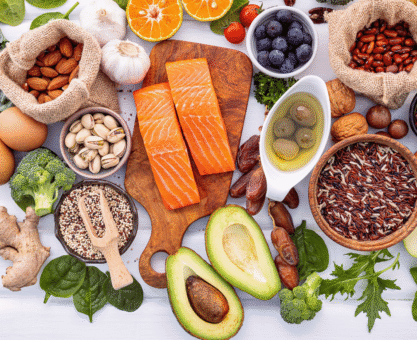Stress & Your Gut: How Anxiety Affects Your Digestion
July 5, 2025
From Oranges to Energy: Vitamin C’s Health Secrets
Vitamin C is a vital nutrient that powers immunity, skin health, and energy, making it a summer...
July 4, 2025
B Vitamins, Big Benefits: Natural Sources to Thrive
Vitamin B is a group of eight essential nutrients that power your body’s energy, mood, and brain...
July 3, 2025
Vitamin A Vibes: Unlock Vision, Immunity & Glow Naturally
Vitamin A is a powerhouse nutrient that fuels your body’s vitality, from sharp vision to glowing...
July 2, 2025
Digital Detox Retreats – Unplug to Recharge Your Mind
In today’s hyper-connected world, our devices keep us tethered to notifications, emails, and...
July 1, 2025
The Hidden Dangers of E-Cigarettes: What You Need to Know
E-cigarettes, often marketed as a safer alternative to traditional smoking, have surged in...
July 1, 2025
Stay Cool & Calm: Mindfulness Practices for Monsoon Days
Mid-summer 2025’s warm, rainy monsoon can bring stress and lethargy, but mindfulness practices...
June 30, 2025
Glow from Within: Monsoon Hair & Scalp Care Through Nutrition
Monsoon’s warm rains and humidity in mid-summer 2025 can make hair frizzy and scalps prone to...
June 28, 2025
Thrive in the Wet: Monsoon Nutrition & Self-Care for Radiant Health
Mid-summer 2025’s rainy, humid days can challenge your energy and immunity, but smart nutrition...
June 27, 2025
Mood Boost in the Monsoon: Fun Indoor Activities for Wellness
Mid-summer 2025 brings warm rains and humid days, which can dampen your mood. Staying indoors...
June 25, 2025
Festival Ready: Nutrition Tips for Summer Energy
Summer festivals are all about music, fun, and long days in the sun, but staying energized requires...
1. Stress Slows Digestion via Fight-or-Flight
Anxiety activates your body’s fight-or-flight response, diverting energy from digestion to survival mode. This slows gut motility, causing bloating, cramps, or constipation. For those with IBS, stress can worsen symptoms. Practice deep breathing or diaphragmatic exercises for 5-10 minutes daily to activate the parasympathetic system, calming your gut and easing discomfort.

2. Anxiety Disrupts Gut Bacteria Balance
Stress hormones like cortisol reduce beneficial gut bacteria, disrupting your microbiome. This imbalance triggers inflammation and impairs nutrient absorption. Incorporate probiotic-rich foods like yogurt, kefir, or sauerkraut into your diet. Prebiotic fibers from bananas or onions also feed good bacteria, supporting a resilient gut against stress-induced changes.

3. Stress Increases Stomach Acid Production
Anxiety can cause “butterflies,” nausea, or heartburn by boosting stomach acid. This irritates the stomach lining, leading to discomfort or acid reflux. Avoid triggers like caffeine, spicy foods, or alcohol during high-stress periods. Practice mindful eating—chew slowly and eat in a calm environment—to reduce acid production and support smoother digestion.

4. Chronic Stress Leads to Leaky Gut
Prolonged stress weakens the gut lining, causing “leaky gut,” where toxins leak into the bloodstream, sparking systemic inflammation. This can exacerbate digestive issues and fatigue. Consume gut-repairing nutrients like omega-3s (found in fish) or glutamine (in bone broth or spinach). Reduce processed foods to strengthen the gut barrier and lower inflammation risk.

5. Gut Health Impacts Anxiety in a Feedback Loop
A stressed gut can worsen anxiety, as 90% of serotonin—a mood stabilizer—is made in the gut. Poor gut health disrupts this process, amplifying stress. Break the cycle with lifestyle changes: prioritize 7-8 hours of sleep, engage in moderate exercise like walking, and practice stress-reducing techniques like yoga or journaling to support both gut and mental health.

Stress and your gut are deeply connected. By managing anxiety through mindful practices, eating gut-friendly foods, and adopting healthy habits, you can protect your digestion and mood. Start small—try a probiotic snack or a 5-minute meditation—and build from there. A balanced gut supports a calmer mind, creating a healthier you.
References:
- Harvard Medical School: The Gut-Brain Connection
- Journal of Clinical Gastroenterology: Stress and the Gut Microbiome
- American Gastroenterological Association: Diet and Digestive Health



1. Stress Slows Digestion via Fight-or-Flight
Anxiety activates your body’s fight-or-flight response, diverting energy from digestion to survival mode. This slows gut motility, causing bloating, cramps, or constipation. For those with IBS, stress can worsen symptoms. Practice deep breathing or diaphragmatic exercises for 5-10 minutes daily to activate the parasympathetic system, calming your gut and easing discomfort.

2. Anxiety Disrupts Gut Bacteria Balance
Stress hormones like cortisol reduce beneficial gut bacteria, disrupting your microbiome. This imbalance triggers inflammation and impairs nutrient absorption. Incorporate probiotic-rich foods like yogurt, kefir, or sauerkraut into your diet. Prebiotic fibers from bananas or onions also feed good bacteria, supporting a resilient gut against stress-induced changes.

3. Stress Increases Stomach Acid Production
Anxiety can cause “butterflies,” nausea, or heartburn by boosting stomach acid. This irritates the stomach lining, leading to discomfort or acid reflux. Avoid triggers like caffeine, spicy foods, or alcohol during high-stress periods. Practice mindful eating—chew slowly and eat in a calm environment—to reduce acid production and support smoother digestion.

4. Chronic Stress Leads to Leaky Gut
Prolonged stress weakens the gut lining, causing “leaky gut,” where toxins leak into the bloodstream, sparking systemic inflammation. This can exacerbate digestive issues and fatigue. Consume gut-repairing nutrients like omega-3s (found in fish) or glutamine (in bone broth or spinach). Reduce processed foods to strengthen the gut barrier and lower inflammation risk.

5. Gut Health Impacts Anxiety in a Feedback Loop
A stressed gut can worsen anxiety, as 90% of serotonin—a mood stabilizer—is made in the gut. Poor gut health disrupts this process, amplifying stress. Break the cycle with lifestyle changes: prioritize 7-8 hours of sleep, engage in moderate exercise like walking, and practice stress-reducing techniques like yoga or journaling to support both gut and mental health.

Stress and your gut are deeply connected. By managing anxiety through mindful practices, eating gut-friendly foods, and adopting healthy habits, you can protect your digestion and mood. Start small—try a probiotic snack or a 5-minute meditation—and build from there. A balanced gut supports a calmer mind, creating a healthier you.
References:
- Harvard Medical School: The Gut-Brain Connection
- Journal of Clinical Gastroenterology: Stress and the Gut Microbiome
- American Gastroenterological Association: Diet and Digestive Health
July 5, 2025
From Oranges to Energy: Vitamin C’s Health Secrets
Vitamin C is a vital nutrient that powers immunity, skin health, and energy, making it a summer...
July 4, 2025
B Vitamins, Big Benefits: Natural Sources to Thrive
Vitamin B is a group of eight essential nutrients that power your body’s energy, mood, and brain...
July 3, 2025
Vitamin A Vibes: Unlock Vision, Immunity & Glow Naturally
Vitamin A is a powerhouse nutrient that fuels your body’s vitality, from sharp vision to glowing...
July 2, 2025
Digital Detox Retreats – Unplug to Recharge Your Mind
In today’s hyper-connected world, our devices keep us tethered to notifications, emails, and...
July 1, 2025
The Hidden Dangers of E-Cigarettes: What You Need to Know
E-cigarettes, often marketed as a safer alternative to traditional smoking, have surged in...
July 1, 2025
Stay Cool & Calm: Mindfulness Practices for Monsoon Days
Mid-summer 2025’s warm, rainy monsoon can bring stress and lethargy, but mindfulness practices...
June 30, 2025
Glow from Within: Monsoon Hair & Scalp Care Through Nutrition
Monsoon’s warm rains and humidity in mid-summer 2025 can make hair frizzy and scalps prone to...
June 28, 2025
Thrive in the Wet: Monsoon Nutrition & Self-Care for Radiant Health
Mid-summer 2025’s rainy, humid days can challenge your energy and immunity, but smart nutrition...
June 27, 2025
Mood Boost in the Monsoon: Fun Indoor Activities for Wellness
Mid-summer 2025 brings warm rains and humid days, which can dampen your mood. Staying indoors...
June 25, 2025
Festival Ready: Nutrition Tips for Summer Energy
Summer festivals are all about music, fun, and long days in the sun, but staying energized requires...








